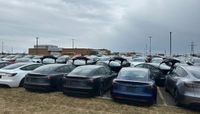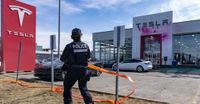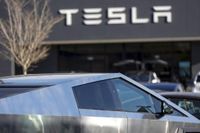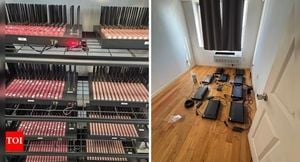In Hamilton, Ontario, over 80 Tesla vehicles were found vandalized with deep scratches and punctured tires, sparking significant concern within the community and among Tesla enthusiasts. This incident, which occurred on March 20, 2025, at a dealership on Upper Wentworth Street near Limeridge Mall, has led local police to investigate further, including reviewing surveillance footage and reaching out for public assistance.
The Hamilton police responded swiftly to reports of damage made to the vehicles and confirmed that, following their investigation, they had uncovered what appeared to be deliberate acts of vandalism. "Officers discovered upwards of 80 damaged vehicles parked outside the dealership," said a police spokesperson. With each car bearing signs of abuse, the need for vigilance among dealerships and car owners has become paramount.
This vandalism reflects a broader context of unrest, particularly aimed at Tesla and its CEO, Elon Musk. Recent months have shown a disturbing trend of arson attacks and vandalism targeting Tesla properties, not just across Canada but throughout the United States as well. Reports from the U.S. indicate that these incidents have surged, coinciding with Musk's recent appointment by U.S. President Donald Trump to a government position intended to streamline federal efficiency and cut down on spending.
Adding to the tensions, police in London, Ontario, are currently investigating a serious fire incident that occurred on March 17, 2025, where a 2025 black four-door Tesla S sustained significant damage. Luckily, there were no injuries reported from that case, but it further highlights the precarious situation surrounding Tesla vehicles and their owners during this tumultuous period.
In Hamilton, the discovery of the damaged Teslas coincided with increased global attacks on Tesla properties that have reportedly been tied to discontent with Musk's role in the Trump administration. As the backlash grows, several Tesla showrooms and charging stations have been defaced, and Musk himself recently expressed his frustration with the situation. “These attacks are deranged,” he stated during an appearance on Fox News earlier in the week, highlighting the bizarre atmosphere surrounding his brand and its leadership.
The escalation of these incidents is not solely based on vandalism; there are larger socio-political dynamics at play. Tesla has become a symbol in the ongoing trade and diplomatic tensions between the United States and Canada—existing animosities that have only intensified under Trump's administration. His administration has imposed tariffs on Canadian goods, provoking countermeasures from Canada, further straining relations that, until recently, were among the closest in the world.
A bitter steel trade dispute, arising from tariffs imposed by Trump, has triggered a response from Canada, which has begun enforcing levies on numerous American exports, valued at over $20 billion. Both countries are wrestling with the implications of these new policies as citizens express their discontent through protests and grassroots movements. Some Canadians have even initiated petitions aimed at revoking Musk’s Canadian citizenship; as of now, this petition has garnered approximately 376,000 signatures.
Adding fuel to the fire, a recent incident in Montreal saw two members of the climate advocacy organization, Last Generation Canada, vandalize a Tesla dealership by spraying it with pink paint. Their rationale was tied to Musk's perceived support of climate denial and authoritarianism. The two individuals were arrested but the situation epitomizes the increasingly volatile relationship between Tesla supporters and detractors as the political climate in North America shifts.
Meanwhile, the Honda auto show cancelled Tesla’s participation last month out of fears of protests and backlash. Executive Director Eric Nicholl stated, “This decision will ensure all attendees can be solely focused on enjoying the many positive elements of the event.” Such cancellations further illustrate the growing rift that Tesla now faces amidst its expanding global presence.
The actions taken against Tesla are changing the landscape of how automotive brands are perceived in a politically charged environment. Detractors are experiencing a growing movement that translates their political beliefs into action. With social media amplifying their voices, discontent is being expressed through direct action against luxury vehicles that symbolize wealth, technological advancement, and the intersection with controversial political maneuvers.
The ramifications of these events extend beyond mere vandalism and property damage; they reflect a complex interplay of social, political, and economic factors that will undoubtedly play a crucial role in shaping the future of the automotive industry, especially for brands like Tesla. Will this ongoing unrest spark more widespread protests, or will it serve as a wake-up call for unity among various factions in the automotive realm? These are pressing questions that impact the industry, consumers, and communities alike.
As investigations continue into the Hamilton incident, the police remain steadfast in their commitment to identifying and apprehending those responsible. Community members and Tesla owners are urged to report any suspicious activity, ensuring that no one has to endure a similar fate as the unfortunate Tesla owners in Hamilton.
This incident highlights the need for dialogue and understanding amid political tensions, bridging the gap between differing beliefs about government leadership and corporate responsibility, as the automotive industry navigates new challenges in an increasingly divided society.







